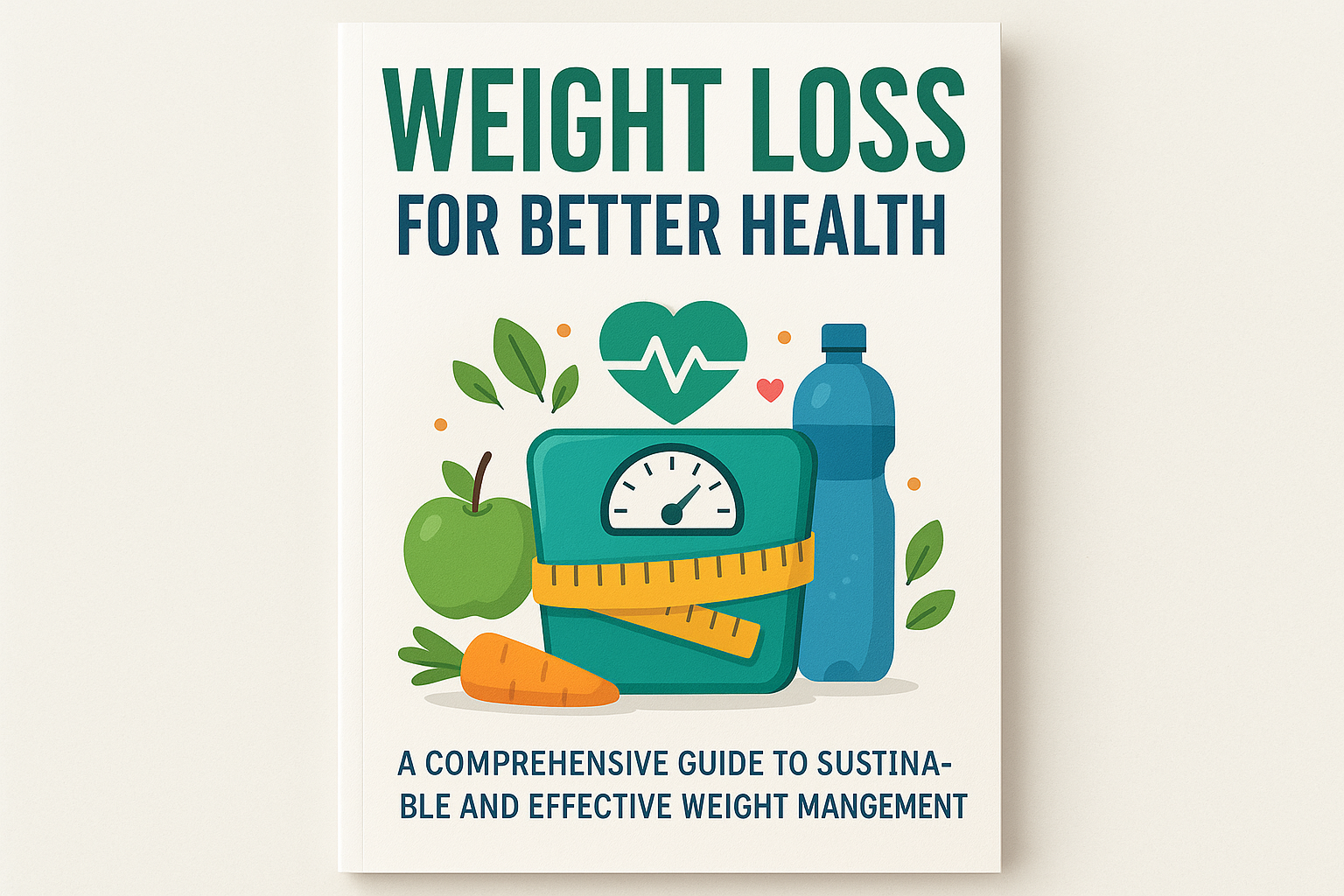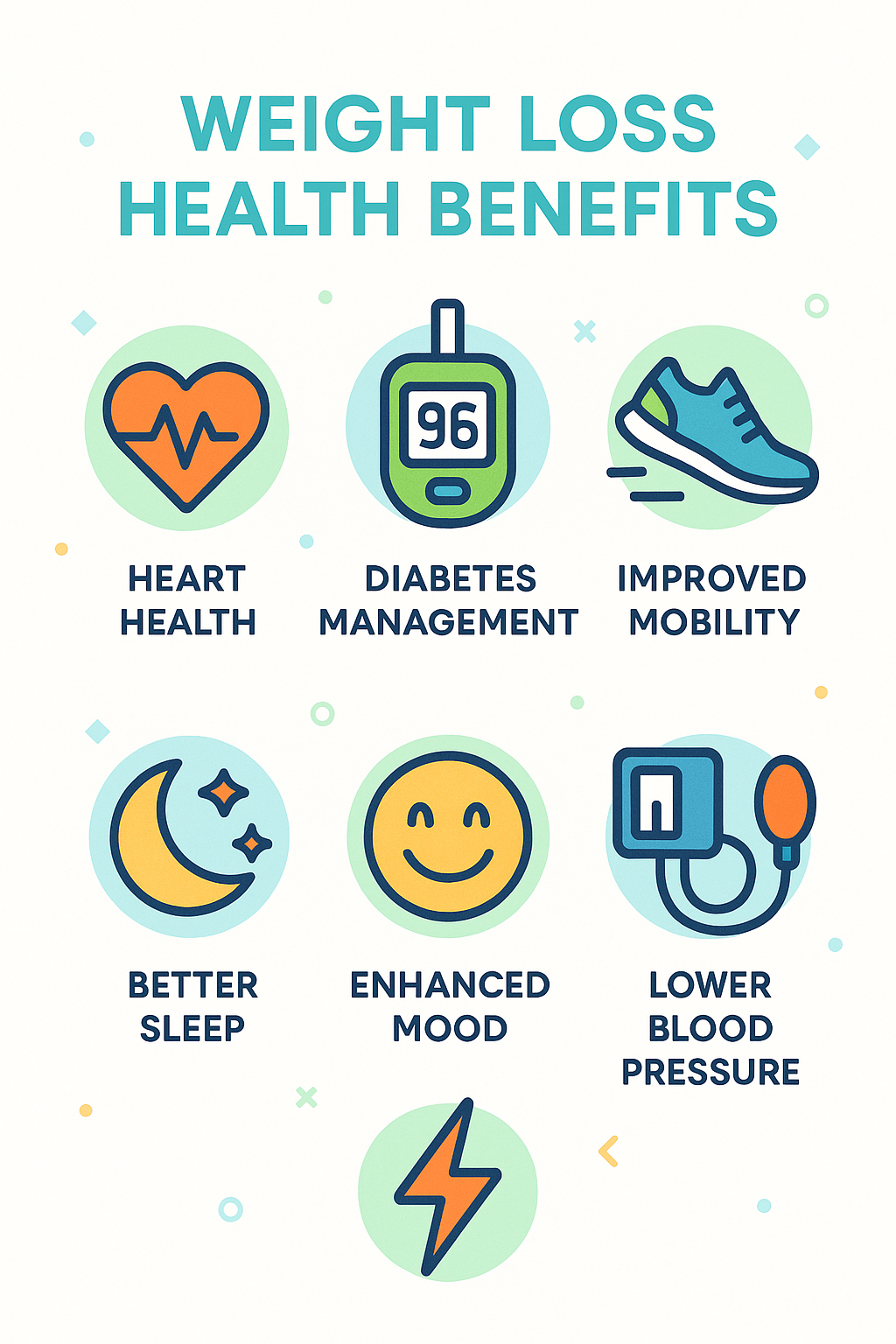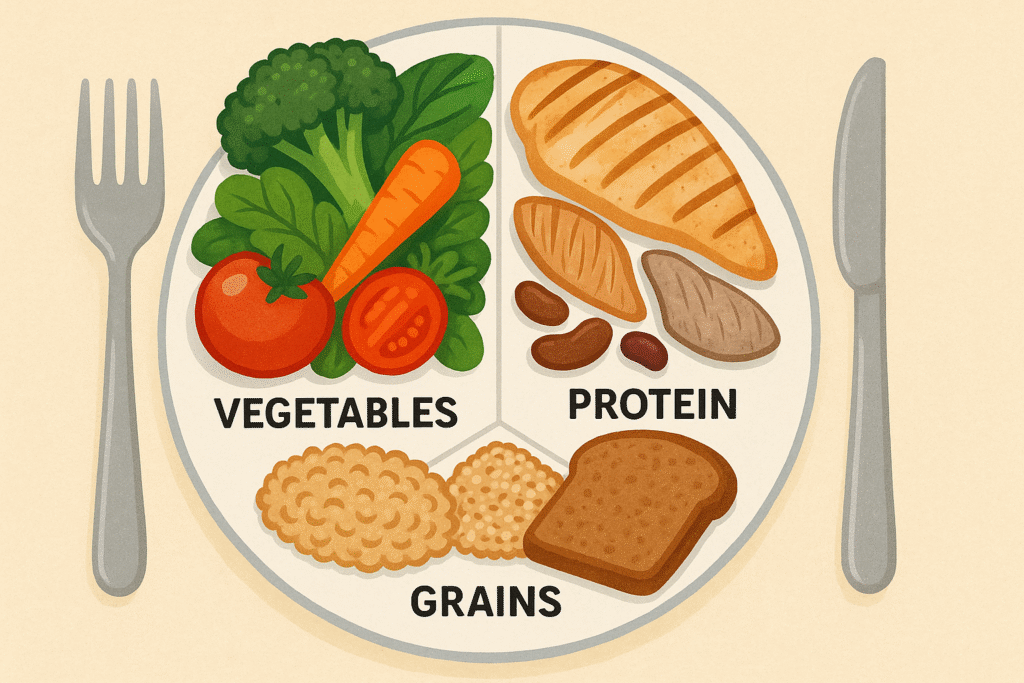
The Critical Connection Between Weight and Health
Weight loss represents one of the most impactful interventions for improving overall health and reducing disease risk. Even modest weight loss of 5-10% of total body weight can produce profound health benefits that extend far beyond appearance. The relationship between excess weight and chronic disease is well-established, making weight management a cornerstone of preventive medicine and optimal health.
The growing obesity epidemic affects more than 70% of adults in the United States, with 40% classified as obese and 32% as overweight. This alarming trend has significant health implications, as carrying excess weight increases the risk of numerous serious conditions including cardiovascular disease, type 2 diabetes, certain cancers, and mental health disorders.

Immediate and Long-Term Health Benefits of Weight Loss
Cardiovascular Health Improvements
Weight loss dramatically improves heart health by reducing the workload on the cardiovascular system. Every pound of adipose tissue contains hundreds of feet of blood vessels requiring oxygen and nutrients, forcing the heart to work harder to pump blood throughout the body. This increased demand leads to elevated blood pressure and contributes to the development of hypertension.
Losing weight provides immediate cardiovascular benefits by:
- Reducing blood pressure and arterial stress
- Lowering LDL (“bad”) cholesterol levels
- Decreasing triglyceride concentrations
- Improving overall heart function and reducing cardiovascular event risk
Research demonstrates that even a 5% weight reduction can produce measurable improvements in blood pressure and cholesterol levels.
Diabetes Prevention and Management
The relationship between weight loss and diabetes prevention is particularly compelling. Nearly 90% of people with type 2 diabetes have overweight or obesity. Excess body fat causes inflammation and interferes with insulin function, leading to insulin resistance and elevated blood glucose levels.
Weight loss benefits for diabetes include:
- 16% reduction in diabetes risk for every kilogram lost in individuals with prediabetes
- Improved insulin sensitivity with as little as 5% weight reduction
- Better blood sugar control in existing diabetics
- Potential for diabetes remission in some cases with significant weight loss
The Diabetes Prevention Program demonstrated that an average weight loss of 6.7% reduced diabetes incidence by 58% over three years.
Cancer Risk Reduction
Weight loss significantly reduces the risk of multiple cancer types. Obesity-related inflammation and hormonal changes contribute to cancer development, particularly in hormone-sensitive tissues. Fat accumulations around vital organs may cause inflammation that promotes cancer cell growth.
Cancers linked to excess weight include:
- Breast cancer (post-menopause)
- Colorectal cancer
- Endometrial cancer
- Kidney cancer
- Liver cancer
- Pancreatic cancer
- Esophageal cancer
- Gallbladder cancer
Research indicates that 4-8% of all cancers may be linked to obesity, with cancer risk increasing proportionally with BMI.
Mental Health and Quality of Life Benefits
Weight loss produces significant improvements in mental health and psychological well-being. The mental health benefits of weight loss are multifaceted and often occur simultaneously with physical improvements.
Key mental health benefits include:
- Reduced symptoms of depression and anxiety within three months of weight loss
- Improved mood stability and emotional regulation
- Enhanced self-esteem and body image
- Better sleep quality and cognitive function
- Increased social connections and participation in activities
- Higher overall life satisfaction
Studies demonstrate that behavioral weight loss interventions consistently improve depression, mental health-related quality of life, and self-efficacy. The psychological benefits appear to be dose-dependent, with greater weight loss producing more substantial mental health improvements.
Enhanced Physical Function and Mobility
Weight loss dramatically improves physical function and reduces joint pain. Excess weight places significant stress on weight-bearing joints, particularly the knees, hips, and spine.
Physical function improvements include:
- Reduced joint pain and stiffness
- Improved mobility and walking distance
- Enhanced balance and coordination
- Increased energy levels and reduced fatigue
- Better respiratory function and reduced sleep apnea symptoms
- Improved sexual function and fertility
Even a 5-10% weight reduction can significantly improve knee functionality and reduce pain in individuals with osteoarthritis.

Evidence-Based Strategies for Sustainable Weight Loss
Creating an Appropriate Caloric Deficit
Successful weight loss fundamentally requires creating a consistent caloric deficit. To lose 1-2 pounds per week, individuals need to create a deficit of 500-750 calories per day through diet, exercise, or preferably both.
Safe weight loss guidelines recommend:
- 1-2 pounds per week as the optimal rate for sustainable weight loss
- Initial weight loss of 5-10% of body weight as a realistic first goal
- Gradual reduction in calories rather than extreme restriction
- Monitoring and adjusting approach based on progress
Nutritional Strategies for Weight Management
Balanced, Hypocaloric Diets
The most sustainable approach to weight loss involves a nutritionally balanced, hypocaloric diet. This strategy reduces calories while maintaining nutritional adequacy and food variety.
- Following established dietary guidelines (Mediterranean diet, DASH diet)
- Including all food groups in appropriate portions
- Emphasizing nutrient-dense, low-calorie foods
- Limiting processed foods, added sugars, and excessive fats
- Consuming adequate protein to preserve muscle mass
Macronutrient Considerations
Different macronutrient approaches can support weight loss, but caloric deficit remains primary. Research shows that various dietary patterns can be effective when calories are controlled.
- High-protein diets (30% of calories from protein) for improved satiety and muscle preservation
- Mediterranean-style diets emphasizing fruits, vegetables, whole grains, and healthy fats
- Moderate carbohydrate restriction focusing on complex carbohydrates and fiber
- Low-fat diets with emphasis on lean proteins and vegetables
The optimal macronutrient distribution varies by individual preference, metabolic factors, and sustainability considerations.
Physical Activity and Exercise
Combining dietary changes with increased physical activity produces superior weight loss results compared to either approach alone. Exercise provides multiple benefits beyond calorie burning, including metabolic improvements and muscle preservation.
Recommended physical activity includes:
- Minimum 150 minutes of moderate-intensity aerobic activity per week
- Strength training exercises at least twice weekly
- High-intensity interval training (HIIT) for enhanced calorie burn
- Daily activities like walking, taking stairs, and active transportation
- Progressive increases in activity intensity and duration
Research indicates that individuals maintaining weight loss typically engage in 200+ minutes of physical activity weekly.
Behavioral Strategies and Support
Behavioral interventions significantly enhance weight loss success by addressing psychological and environmental factors. These strategies help individuals develop sustainable habits and overcome common barriers.
Effective behavioral strategies include:
- Self-monitoring through food diaries and regular weighing
- Goal setting using SMART criteria (Specific, Measurable, Achievable, Realistic, Time-bound)
- Identifying and managing triggers for overeating
- Building support networks and accountability systems
- Stress management and emotional regulation techniques
- Mindful eating practices and hunger awareness
Studies show that behavioral interventions combined with dietary and exercise changes produce the most successful long-term outcomes.
Weight Loss Maintenance Strategies
Maintaining weight loss presents greater challenges than initial weight loss, with most individuals regaining weight without continued intervention. Successful maintenance requires ongoing attention to multiple factors.
Key maintenance strategies include:
- Continued self-monitoring of weight and food intake
- Regular physical activity (often requiring higher levels than for initial weight loss)
- Consistent eating patterns throughout the week
- High protein intake to preserve muscle mass and enhance satiety
- Strong social support systems and professional guidance
- Flexible approaches that accommodate life changes
Research from the National Weight Control Registry identifies six key strategies for long-term success: high levels of physical activity, eating breakfast, self-monitoring, consistent eating patterns, catching weight regain early, and maintaining a low-fat, low-calorie diet.

Potential Risks and Considerations
Rapid Weight Loss Concerns
While desire for quick results is understandable, rapid weight loss can pose health risks. Losing more than 2 pounds per week may lead to muscle loss, nutritional deficiencies, gallstones, and metabolic slowdown.
Risks of excessive weight loss include:
- Muscle mass reduction and metabolic slowdown
- Nutritional deficiencies and electrolyte imbalances
- Gallstone formation
- Hair loss and skin problems
- Psychological stress and eating disorder development
- Increased risk of weight regain
Individual Considerations
Weight loss approaches should be individualized based on personal factors, medical history, and preferences. Factors affecting weight loss success include genetics, medications, hormonal status, age, and underlying medical conditions.
Important considerations include:
- Medical clearance for individuals with chronic conditions
- Medication adjustments that may affect weight
- Hormonal factors (thyroid, insulin, reproductive hormones)
- Psychological readiness and motivation assessment
- Cultural and lifestyle factors affecting food choices and activity
Professional Support and Medical Intervention
Healthcare professional guidance enhances weight loss success and safety. Medical supervision becomes particularly important for individuals with significant weight to lose or underlying health conditions.
Professional interventions may include:
- Dietitian consultation for personalized nutrition planning
- Physician oversight for individuals with medical conditions
- Psychological support for behavioral change and motivation
- Pharmacotherapy for appropriate candidates (BMI ≥30 or ≥27 with comorbidities)
- Surgical interventions for severe obesity with comprehensive support
Creating a Sustainable Weight Loss Plan
Setting Realistic Goals
Successful weight loss begins with setting appropriate, achievable goals. Research consistently shows that modest, gradual weight loss is more sustainable than dramatic changes.
Effective goal-setting includes:
- Initial target of 5-10% weight loss over 6 months
- Weekly goals of 1-2 pounds weight loss
- Process goals focusing on behaviors rather than just outcomes
- Regular reassessment and goal adjustment based on progress
- Celebration of non-scale victories and health improvements
Building Healthy Habits
Long-term success depends on developing sustainable lifestyle habits rather than temporary dietary restrictions. The most effective approaches focus on gradual behavior change and habit formation.
Key habit-building strategies include:
- Starting with small, manageable changes
- Focusing on adding healthy behaviors rather than just restricting
- Creating supportive environmental changes
- Developing consistent routines and meal planning
- Building flexibility and resilience for setbacks
The Future of Weight Management
Advances in personalized medicine, technology, and behavioral science continue to enhance weight management approaches. Emerging research in areas such as gut microbiome, genetic factors, and precision nutrition may lead to more individualized and effective interventions.
Current developments include:
- Personalized nutrition based on genetic and metabolic factors
- Technology-assisted monitoring and support systems
- Enhanced understanding of hormonal and metabolic factors
- Improved behavioral intervention techniques
- Better integration of mental health support
Conclusion
Weight loss for better health represents one of the most powerful interventions for improving quality of life and reducing chronic disease risk. The benefits extend far beyond appearance, encompassing cardiovascular health, diabetes prevention, cancer risk reduction, mental health improvements, and enhanced physical function.
Success requires a comprehensive approach combining appropriate caloric deficit, balanced nutrition, regular physical activity, and behavioral support. The key to sustainable weight loss lies in making gradual, manageable changes that can be maintained long-term rather than pursuing rapid, dramatic transformations.
With proper planning, professional support when needed, and commitment to evidence-based strategies, individuals can achieve meaningful weight loss and experience the profound health benefits that result. The investment in weight management pays dividends in improved health, increased longevity, and enhanced quality of life across all domains of well-being.





